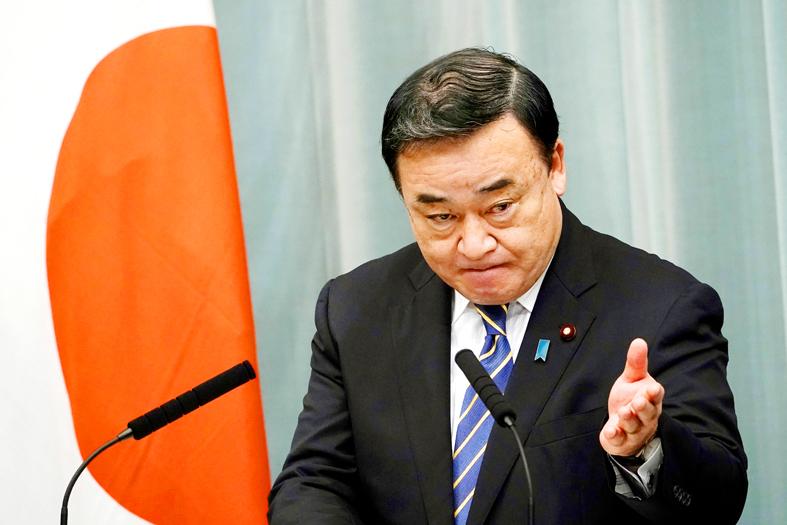Japan has asked some Taiwanese manufacturers to cooperate in alternative production of semiconductors, Japanese Minister of Economy, Trade and Industry Hiroshi Kajiyama said yesterday, after a chip plant owned by Renesas Electronics Corp was hit by a fire this month.
“We are in communication with several manufacturing equipment makers [in Taiwan] to speed up procurement,” Kajiyama told reporters after a Cabinet meeting.
“The ministry will also work together for a swift recovery by using all possible means,” he added.

Photo: Eugene Hoshiko, AP
A Renesas-owned Naka chip plant in northeast Japan was hit by fire earlier this month due to a power surge in one of the machines, putting more pressure on the broader chips industry amid a global shortage of semiconductors.
The company, which has about a 30 percent share of the global market for microcontroller unit chips used in vehicles, had initially said 11 machines were damaged in the fire, but yesterday said 23 machines need to be replaced.
Renesas chief executive officer Hidetoshi Shibata told a news conference that while production at the plant would resume within a month, recovery to pre-fire levels was expected to take 100 to 120 days from the incident.
He added that any short-term shipment of alternative chip production was impossible and the company would recuperate losses in the six months ending in December.
An extended outage could add to a global shortage of chips, which is disrupting some production of vehicles and electronic devices.
The Japanese government has called on equipment makers to help Renesas restore its production, with bureaucrats contacting companies at home and overseas to request they provide parts and machinery to the fire-hit company, a trade ministry official told reporters.

RECYCLE: Taiwan would aid manufacturers in refining rare earths from discarded appliances, which would fit the nation’s circular economy goals, minister Kung said Taiwan would work with the US and Japan on a proposed cooperation initiative in response to Beijing’s newly announced rare earth export curbs, Minister of Economic Affairs Kung Ming-hsin (龔明鑫) said yesterday. China last week announced new restrictions requiring companies to obtain export licenses if their products contain more than 0.1 percent of Chinese-origin rare earths by value. US Secretary of the Treasury Scott Bessent on Wednesday responded by saying that Beijing was “unreliable” in its rare earths exports, adding that the US would “neither be commanded, nor controlled” by China, several media outlets reported. Japanese Minister of Finance Katsunobu Kato yesterday also

Jensen Huang (黃仁勳), founder and CEO of US-based artificial intelligence chip designer Nvidia Corp and Taiwan Semiconductor Manufacturing Co (TSMC, 台積電) on Friday celebrated the first Nvidia Blackwell wafer produced on US soil. Huang visited TSMC’s advanced wafer fab in the US state of Arizona and joined the Taiwanese chipmaker’s executives to witness the efforts to “build the infrastructure that powers the world’s AI factories, right here in America,” Nvidia said in a statement. At the event, Huang joined Y.L. Wang (王英郎), vice president of operations at TSMC, in signing their names on the Blackwell wafer to

‘DRAMATIC AND POSITIVE’: AI growth would be better than it previously forecast and would stay robust even if the Chinese market became inaccessible for customers, it said Taiwan Semiconductor Manufacturing Co (TSMC, 台積電) yesterday raised its full-year revenue growth outlook after posting record profit for last quarter, despite growing market concern about an artificial intelligence (AI) bubble. The company said it expects revenue to expand about 35 percent year-on-year, driven mainly by faster-than-expected demand for leading-edge chips for AI applications. The world’s biggest contract chipmaker in July projected that revenue this year would expand about 30 percent in US dollar terms. The company also slightly hiked its capital expenditure for this year to US$40 billion to US$42 billion, compared with US$38 billion to US$42 billion it set previously. “AI demand actually

RARE EARTHS: The call between the US Treasury Secretary and his Chinese counterpart came as Washington sought to rally G7 partners in response to China’s export controls China and the US on Saturday agreed to conduct another round of trade negotiations in the coming week, as the world’s two biggest economies seek to avoid another damaging tit-for-tat tariff battle. Beijing last week announced sweeping controls on the critical rare earths industry, prompting US President Donald Trump to threaten 100 percent tariffs on imports from China in retaliation. Trump had also threatened to cancel his expected meeting with Chinese President Xi Jinping (習近平) in South Korea later this month on the sidelines of the APEC summit. In the latest indication of efforts to resolve their dispute, Chinese state media reported that